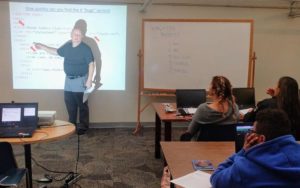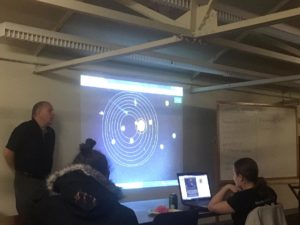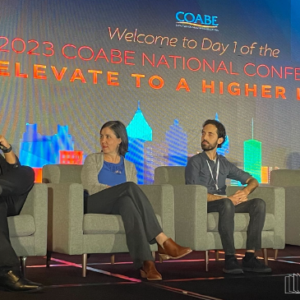By Karisa Tashjian
In the past ten months, our team at Providence Public Library (PPL) in Providence, Rhode Island, has been repeatedly reminded to never underestimate the potential that lies in each of us. As my colleague, Don Gregory, Technology Instructor at PPL, likes to say, “we are polishing diamonds.” Since launching our beginning software coding “Rhode Coders” Clubs, we are witnessing first-hand the unique and powerful ways that each of our minds tackles problems and develops solutions.
Our Rhode Coders Clubs are free for any adult with an interest or curiosity about software coding. We don’t have any prerequisites – no entry language level, no prior skills. Our goal is to foster exploration of the world of computer science without the barriers of cost, fear, or lack of knowledge. We teach the basic steps of coding with a focus on Web apps. Participants increase their vocabulary and language about coding, explore possible career paths, learn the various usages and purposes of coding/programming, increase their analytical and logical thinking skills and join a support community of learning around coding.
The Rhode Coders Club model was designed by Don and RIFLI ESL Teacher, Larry Britt. Participants get to try web and game development programming in a fun and collaborative environment. We have now run five cohorts and 75 adults have participated in these ten-week sessions. The Clubs meet once a week for an hour and a half. 40% of the participants have been women. Rhode Coders have ranged in age from 18 to 64. We have non-native English speakers who are part of the group and supported by an ESL teacher. The ESL teacher provides language support as needed, however, we have found that coding is a “universal language” and learners catch on quickly.
We now offer two levels – a “Web Basics” section which focuses on HTML and CSS basics. There is also a “Scripting Basics” section which focuses on JavaScript basics and, if time permits, an introduction to Python. Don has developed a 20-week curriculum that includes use of Mozilla’s Thimble IDE, Codecademy.com and w3schools.com. A typical session includes warm-up logic puzzles, followed by some direct instruction on a particular coding topic and ends with time for participants to work on individual projects. Each 10-week session concludes with participants sharing their projects.
 Rhode Coders has caught the attention of our state’s workforce development system as it fills a gap between the need for more coders and the lack of skilled workers for these positions. We have partnered with TechHire Rhode Island which is “a network that connects employers seeking IT talent with Rhode Islanders who possess unique backgrounds and can get the job done.” TechHire is an initiative “powered by Opportunity@Work in partnership with the U.S. Department of Education, [and] is a nationwide, community-based movement that helps underrepresented and overlooked job seekers start technology careers.” TechHire is now located in 72 communities in the United States. We also partner with LaunchCode and other structured coding programs to help Rhode Coders seamlessly enter these programs. We have had six Rhode Coders enter these more formal programs.
Rhode Coders has caught the attention of our state’s workforce development system as it fills a gap between the need for more coders and the lack of skilled workers for these positions. We have partnered with TechHire Rhode Island which is “a network that connects employers seeking IT talent with Rhode Islanders who possess unique backgrounds and can get the job done.” TechHire is an initiative “powered by Opportunity@Work in partnership with the U.S. Department of Education, [and] is a nationwide, community-based movement that helps underrepresented and overlooked job seekers start technology careers.” TechHire is now located in 72 communities in the United States. We also partner with LaunchCode and other structured coding programs to help Rhode Coders seamlessly enter these programs. We have had six Rhode Coders enter these more formal programs.
“Everybody in this country should learn how to program a computer … because it teaches you how to think.” ~ Steve Jobs
Not everyone who joins a Rhode Coders Club does so with the intention of pursuing coding as a career. While we do link participants who embrace coding to “next steps,” we have found that some Rhode Coders just want to know what this “coding thing” is all about. In the past year, our Governor has set the goal to have Computer Science (CS) taught in every Rhode Island public school by December 2017. She launched CS4RI which is a coalition approach that combines “national leadership with homegrown talent to reduce barriers to providing quality computer science education and professional development, and will bring CS learning opportunities to all Rhode Island schools in the years ahead.” At PPL, the opportunities for adults to learn about coding help to prevent or decrease another type of digital divide: parents needing to be aware of CS as their children learn coding. PPL has also launched an afterschool Rhode Coders 2.0 Club for teens where they earn .5 high school credit.
We have found that public libraries, adult education organizations and other community organizations are especially well suited to offering coding. Rhode Coders is now offered at three other libraries in RI with plans to expand to 4-6 more as well as a public housing development.
We welcome inquiries about our program. We can be reached at Karisa Tashjian, Director of Education, ktashjian@provlib.org; Don Gregory, Technology Instructor, dgregory@provlib.org and Larry Britt, ESL Instructor, lbritt@provlib.org.
Karisa Tashjian serves as the Director of Education for the Providence Public Library and the Rhode Island Family Literacy Initiative. Karisa is a member of the Rhode Island Department of Education’s Technology Advisory Committee for Adult Education, a board member of the New England Literacy Resource Center and a partner of the EdTech Center.





3 Comments.
This is a wonderful model that I would like to duplicate in Virginia. How should we begin and what can you share with us regarding start-up costs, etc.? Many thanks and congratulations!
Hi Lisa, We’d be happy to share our curriculum and marketing materials with you – feel free to email me. The only costs we have are for the instructor(s) (class time and some preparation time and maybe some marketing). I’m not sure where you are in VA but I’d highly advise connecting with TechHire in your area – they have been a great help to us.
Karisa,
I noticed your exchange with Lisa. We would love to learn more from you! I am coordinating the 2019 Virginia Adult Education & Literacy Conference to be held July 10-12 in Roanoke Virginia. We would love it if you could present a workshop to our participants on the success of your coding club for Adult Learners.
Our Call for Proposals is now open. Information regarding proposal submittals can be found on our conference website.
(https://www.aelconference.com/event/0c24de13-e5ea-4dae-a027-01c42fe90f08/summary?5S%2CM3%2C0c24de13-e5ea-4dae-a027-01c42fe90f08=)
We hope that you will submit a proposal. Please let me know if you need any further information or have questions.